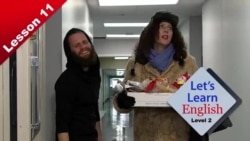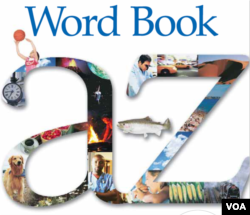Summary
A big snow is coming. Anna and Pete work all weekend to report on it. Have they both prepared for the blizzard? Let's find out!
Conversation
Kelly: Hi, Anna. Why do you have all this weather stuff?
Anna: I love weather.
Kelly: Me too! Weather is so important.
Anna: It is. It affects people’s lives!
Kelly: Have you ever reported on a big weather event?
Anna: I have. I’ve reported on a blizzard.
Kelly: Do mean the one last weekend?
Anna: Yes! I had been waiting for that blizzard for years. When it came, I was ready.
Prof. Bot: Welcome to our most perfect lesson! Why is it perfect? Today we are reviewing the present perfect and past perfect verb tenses. These show that an action is completed.
Kelly uses the present perfect when she says,
Kelly: Have you ever reported on a big weather event?
Anna uses the past perfect when she says,
Anna: I had been waiting for that blizzard for years.
Listen for "have" or "had" and the past participle to find more sentences with the perfect tense. I'll color those words to help you.
Anna: I have wanted to report on a big weather event my whole life.
Kelly: Who hasn’t? Did you report all weekend ... by yourself?
Anna: No, no. I volunteered Pete to help me.
Pete: Why am I here on a Saturday? Why are you carrying things? Why? Why?
Anna: Pete, these are my supplies – food, a blanket; warm clothing. Where are your supplies?
Anna: Pete, Pete, Pete. This could be the “blizzard of the century.”
Pete: It’ll be fine.
Kelly: How else had you prepared?
Anna: Well, I had just bought the latest weather forecasting software. So, I brought it!
Kelly: Do you mean The Weather Genie Pro?
Anna: You know it. Pete thought it was pretty great too.
Pete: Do you have any games on that thing?
Anna: Yes! I have the best weather survival game. Boom!
Pete: Sounds fun.
Anna: It is. But right now, Pete, this computer is a work tool. It will give us the temperature, wind speed, wind direction and amount of snowfall … in real time! Boom, boom!
Pete: I can’t wait.
Anna: Pete, we need a name for this blizzard.
Pete: No, we don’t.
Anna: All the great storms have names.
Pete: No, they don’t.
Anna: I know -- “The Big Snow!”
Pete: I am not saying “The Big Snow.”
Pete: Welcome to “The Big Snow.”
Kelly: The Big Snow broke all kinds of records, didn’t it?
Anna: Yes it did. And every time a record was broken, we celebrated!
Anna: So far, in Washington, D.C. 29 inches of snow has fallen. That, my dear listeners, is a record! (Honks horn)
Anna: We just broke the wind speed record! (Honks horn)
Anna: Snow has been falling for 30 hours straight! That’s another record! (Honks horn. Pete comes into room and breaks the horn.)
Kelly: By Saturday night, stores and restaurants had closed. Did you bring enough food?
Anna: I thought I had brought enough food. But I ran out.
Anna: Hey, Pete, where is my bag of popcorn?
Pete: Maybe you ate it already.
Anna: No, I didn’t.
Pete: I haven't seen it. (Pete has popcorn in his beard. Anna tries to hit him.)
Anna: We had reported together for 48 hours straight!
Kelly: Wow. That must have been a great team-building exercise for you and Pete.
Anna: Yeah. You - you could say that.
Prof. Bot: I hope you found all the sentences with perfect tenses. Learn more on our website!
New Words
Learning Strategy
The learning strategy for this lesson Find and Apply Patterns. That means to look for patterns in what you are learning. For example, we use many patterns to communicate: groups of sounds, letters, and words get our meaning across.
In this lesson, Pete sees a pattern in Anna's celebration of the weather records. Each time a weather record breaks, she honks her horn to celebrate. Pete does not like the horn, so he breaks it before Anna celebrates the next record-breaking weather fact. He is applying his understanding of a pattern to make his life quieter.
How about you? How do you find and apply patterns? Can you see patterns in the way people use English? How about in literature? There are also patterns in math, science, history, music and social studies. Can you think of a time when knowing about a pattern helped you to learn something? Write to us in the Comments section or send us an email.
Listening Quiz
See how well you understand this lesson by taking a listening quiz. Play each short video, then choose the best answer.
Free Materials
Download the VOA Learning English Word Book for a dictionary of the words we use on this website.
For Teachers
Send us an email if you have comments on this course or questions.
Grammar focus: Present Perfect Simple/Continuous; Past Perfect Simple/Continuous
Topics: Describe actions that have occurred; Describe actions that haven't occurred yet; Discuss duration of activity
Learning Strategy: Find / Apply Patterns
Comments
Now it's your turn. Send us an email or write to us in the Comments section below or on our Facebook page to let us know what you think of this lesson.







